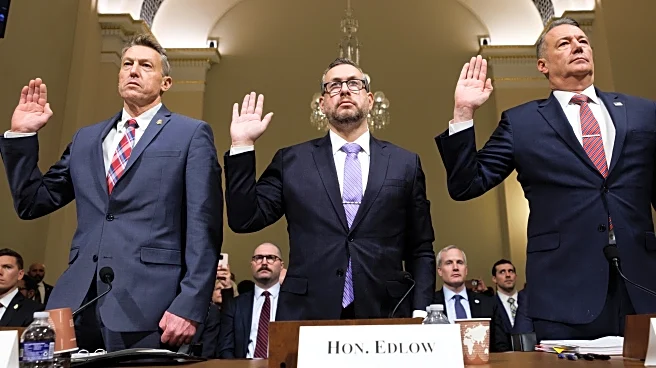What's Happening?
Israeli and Hamas officials are currently engaged in indirect negotiations at an Egyptian coastal resort, focusing on a U.S.-drafted peace plan aimed at ending the ongoing conflict in Gaza. The discussions are centered on the initial phase of a ceasefire, which includes the partial withdrawal of Israeli forces and the exchange of hostages held by militants in Gaza for Palestinian prisoners in Israeli detention. U.S. Middle East envoy Steve Witkoff and Jared Kushner are expected to join the talks. Despite the ongoing negotiations, Israeli airstrikes continue in Gaza, with the Palestinian death toll reaching 67,160 according to Gaza's Health Ministry. The talks are part of a broader effort to address the disarmament of Hamas and the future governance of Gaza.
Why It's Important?
The outcome of these talks could significantly impact the geopolitical landscape of the Middle East. A successful peace plan could lead to a reduction in hostilities and pave the way for long-term stability in the region. The negotiations are crucial for the humanitarian situation in Gaza, where over 2 million residents face severe shortages of food and medical supplies. The U.S. peace plan has garnered support from several Arab and Muslim-majority countries, indicating a potential shift in regional alliances. However, the plan's success hinges on Hamas' acceptance and the ability to address complex issues such as disarmament and governance.
What's Next?
If the talks progress positively, the next steps would involve the implementation of the ceasefire and the facilitation of humanitarian aid into Gaza. The United Nations has expressed readiness to deliver aid once a ceasefire is in place. The international community, including the U.S., is urging Hamas to accept the peace plan to ensure a peaceful and prosperous future for Gaza. The negotiations are expected to continue, with mediators from Egypt and Qatar playing key roles in facilitating discussions between the parties involved.
Beyond the Headlines
The peace talks highlight the intricate balance of power and diplomacy in the Middle East. The involvement of major global players like the U.S. and Russia underscores the international dimension of the conflict. The Vatican's condemnation of both Hamas' attacks and Israel's military response reflects the ethical and humanitarian concerns surrounding the conflict. The peace plan's success could redefine U.S. influence in the region and potentially lead to a Nobel Peace Prize nomination for President Trump, as suggested by families of hostages.











